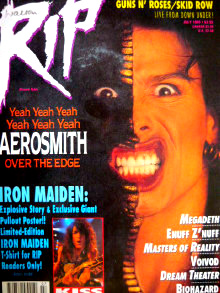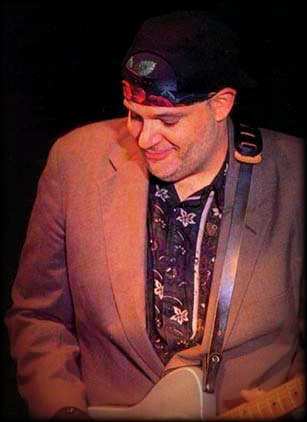|
Artikel © RIP 1993
von Katherine Turman

SECRETS OF THE SUFFERBUS
Okay, so you believe hip, heavy music has to be purveyed by serious young grunge-meisters wearing long shorts, Lollapalooza T-shirts and Doc Martens. Well, think again, because on their new LP, Sunrise On The Sufferbus , Masters of Reality lay down some of the most righteous rock sounds ever created, and they're definitely not young (in fact, there's a grandfather in the band), not long haired pinup hunks given to using "like" and "dude" every other word, and not from the Northwest. They may not fit into any niche, but free thinking rock fans everywhere can't seem to get enough of the Masters' heavy, magical, often quirky vibe. For them, too much time has passed between the band's first and second albums - nigh on four years - but in typical, laid-back Masters fashion, the band is mellow about it.
 |
"Frustrating?" asks vocalist/guitarist Chris Goss, taking a drag off a cigarette. "No, not really. I've been so busy the last couple years, and I've really enjoyed every minute of it. Then twice a year we go to Hawaii, play at the polo club, and eat and drink like pigs. Ginger plays polo, and we smoke green bud."
No wonder he's not frustrated! The Ginger he's referring to is none other than Ginger Baker, ex drummer for Cream and Blind Faith and a longtime polo player with his own string of ponies. The legendary British musician could write his own meal ticket, but he chose to hook up with the Masters in late 1990. Why? "There's not many people around who are perfectly in tune with each other, if you like," explains the drum wizard. "It's a thing I found with Chris, and a thing I think I have with Eric (Clapton) and Jack (Bruce) and Stevie Winwood. It's something people have or they don't, and Chris has it in abundance."
The chemistry was instantaneous, but it was a stroke of luck that Baker even jammed with the band in the first place. "They sent me a tape of the old record, and I thought it was awful," recalls Baker, chuckling. "I just didn't like it. I thought 'There's no way I can have anything in common with them.' I was not at all keen on playing with them, but my wife said, 'Go along, try it.' Against my better judgement I went and was absolutely amazed. Chris and I instantly hit it off musically and played for hours on end. We had a wonderful time. We decided then and there that it would be a good idea to get together and do an album. They had a little tour coming up, so I cancelled this jazz tour I had and found myself doing some of the same venues for a quarter of the price on this awful tour with the Masters where we suffered enormously. It was the worst tour I've ever been involved with in my life! We'd drive 14 hours to a gig and find they didn't have enough power to run the equipment. That happened two nights in a row."
Hence the album title, Sunrise On The Sufferbus? Goss laughingly concurs. "You know those Popeye cartoons where a ship is going around in circles, where it keeps looping around with a little dotted line behind it? That's what the routing of our tour was like. Very strange."
The recording didn't exactly go as planned either. "Our intention was to start recording this record in November of 1990," Baker says, "and we didn't get into the studio until November of '91. We got the tracks done soon, then ran into problems with the record company. It was really awful a lot of the time. I found myself in big financial trouble."
Fortunately a new deal with EMI has provided the band with a solid base. "I know what you're doing. I see how it fits in, even (the song) 'Madonna' " the Masters were told by their A&R rep at the label.
"From an A&R guy, that's like the theory of relativity," laughs Goss
It is an eclectic album, beginning with the black-and-white front cover art of a rabbit riding a bike. From there they delve into the five-lines-long 'Bicycle'; 'T.U.S.A.', Baker's heartfelt lament about second-rate American tea preparers; and 'Ants in the Kitchen' in which Goss sings about the productive little creatures, "There's two right there, making off with the stereo."
Though Goss is seemingly loathe to explain his lyrics, a study of his reading habits helps clarify things. "The kind of books I like have crowded pages, and the next page doesn't have much at all," he says. "When I was a teenager, Kurt Vonnegut books were starting to happen, and I had a copy of Slaughterhouse Five hanging around. His writing was arranged in this wide open kind of way. One page was a regular book kind of narrative, then you'd turn the page, and there'd be a word and a little drawing. I like that kind of format - lyrics that can be full, then empty. Take it wherever you want it to go."
Since the Masters' first Def American release (and the remixed, one new song Delicious Vinyl version), they have lost guitarist Tim Harrington and drummer Vinnie Ludovico, gained Baker and added, then subtracted guitarist/producer Daniel Rey. The band is now a trio (Goss, Baker and bassist Googe) and couldn't be happier. "A trio tells you what to do," explains Goss. "The truth rears it's head after a while. It's evident who's grooving and who isn't."
As for Baker's contribution, Goss feels that "he's more of a dynamic drummer. I've been so happy with the turn the music took dynamically, that we don't have a gorilla playing the drums anymore. As a singer and songwriter I feel like there's someone behind the drums who's listening to my voice and plays accordingly. When Ginger joined, a lot of people kind of stood there and said, 'Whoa, how the hell are they going to do Domino,' like idiots. Who cares? Fuck people. We're a band, and wherever it goes, we want to go with it."
Goss really doesn't care what other people think of things; it's what he thinks that matters - and not in an egotistical, but a caring way. That's why he produces bands he loves (Kik Tracee, I Love You, Kyuss), and why he formed Pacific Records, a label devoted to musicians he passionately believes in.
"Over the last couple years I've been finding a lot of really great songwriters who don't have an outlet because they're not flavor-of-the-month types of writers," he explains. "These are people who would shop their tapes to people who wouldn't get it. One guy writes so that his songs sound a couple hundred years old. He calls himself Zero. Very Renaissance; he's schooled in opera and Shakespeare. Valore is another one. He writes standard jazz vocals, like Tony Bennett stuff. The label is an outlet for weirdos who have nowhere else to go, for stuff that's 'It's good, but what do we do with it?' "
Anachronistic weirdos is a category some might put the Masters into, though the band see themselves as very 90's - despite the fact that they nicked their name from a Black Sabbath album and are admirers of that band's heavy, influential sound.
"They were four working-class guys from Birmingham. They weren't art-school types," says Goss of the Sabs. "They happened to stumble onto a really powerful sound. If there's anything to be learned, it's that sometimes naivete, simplicity and even crossing into stupidity have a lot to do with what the world does. You can be very carefully planned or not, and sometimes the outcome is the same."
Though Masters is certainly not carefully planned, Sunrise On The Sufferbus, while eclectic, even strange at times (listen to 'Madonna' in contrast to 'Tilt-A-Whirl' for instance), is cohesive. Image wise, however, well, let's just say that Goss, with his intimidating shaved head and bulk, isn't what people expect to see after they've listened to his mysteriously sexy and dulcet tones on an MOR album. "Once a week I shave my face and my head, and that's it," he laughs. "Easy maintenance."
In keeping with this oddball vibe, some songs on the album, like 'Ants in the Kitchen', definitely aren't mainstream, mass-appeal ditties. "I don't waste a lot of time on lyrics," says Goss. "Bottom line, it's an album, and though it's a different collection of songs, it sounds good together. This record was done straight from our minds and not from a business standpoint whatsoever. It was, 'Here's a bunch of cool little songs; take 'em or leave 'em'. Fuck everybody. Really."
And if those cool little songs fail to pay the rent, Goss has a backup plan ready: "I'll move to Sedona, Arizona, and open a coffee shop."
At the Sunset Boulevard coffee shop where we're conducting our interview, the hour is growing late. Goss isn't really comfortable answering questions about his band, and when the tape recorder clicks off after 45 minutes, he looks relieved.
"I really believe talk is cheap," he says. "What I do, what any musician does, comes out in the music and not in what they say. It's cool if people like the music and want to know a little bit more about the people who make the music, but the proof is if people sit down and like the album.
"So that's it?" he asks, hopefully. "You want it to be?". "Yeah." And so it was.

|